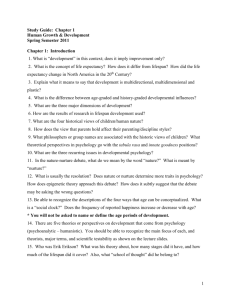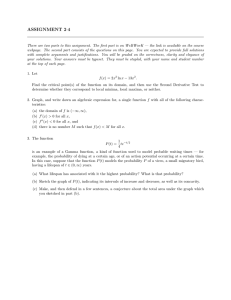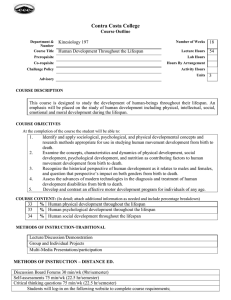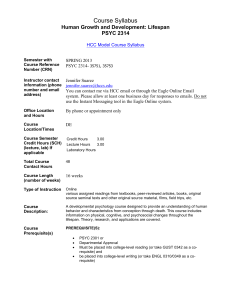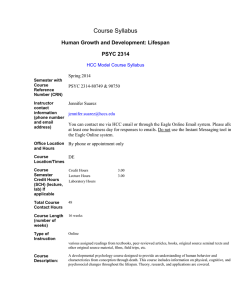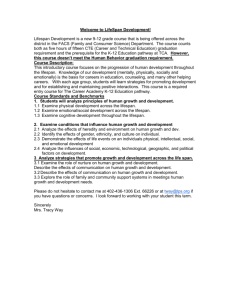HCC Psyc 2314 Fall 2013 Syllabus.doc
advertisement
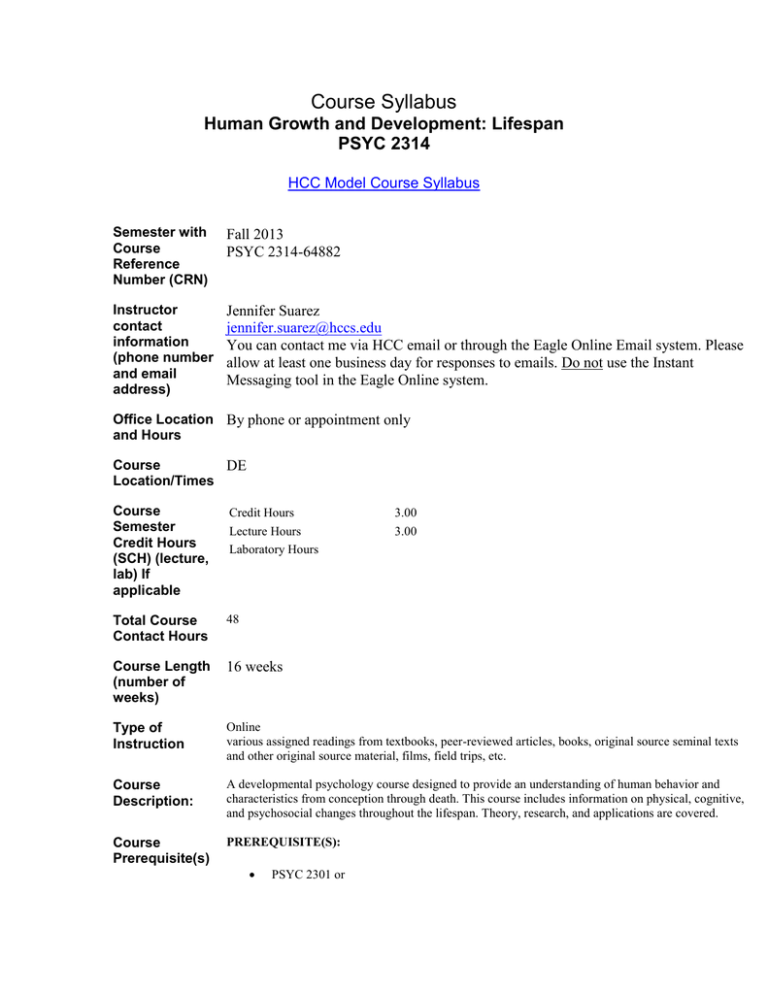
Course Syllabus Human Growth and Development: Lifespan PSYC 2314 HCC Model Course Syllabus Semester with Course Reference Number (CRN) Fall 2013 PSYC 2314-64882 Instructor contact information (phone number and email address) Jennifer Suarez jennifer.suarez@hccs.edu You can contact me via HCC email or through the Eagle Online Email system. Please allow at least one business day for responses to emails. Do not use the Instant Messaging tool in the Eagle Online system. Office Location By phone or appointment only and Hours Course DE Location/Times Course Semester Credit Hours (SCH) (lecture, lab) If applicable Credit Hours Lecture Hours Laboratory Hours Total Course Contact Hours 48 Course Length (number of weeks) 16 weeks Type of Instruction Online various assigned readings from textbooks, peer-reviewed articles, books, original source seminal texts and other original source material, films, field trips, etc. Course Description: A developmental psychology course designed to provide an understanding of human behavior and characteristics from conception through death. This course includes information on physical, cognitive, and psychosocial changes throughout the lifespan. Theory, research, and applications are covered. Course Prerequisite(s) PREREQUISITE(S): PSYC 2301 or 3.00 3.00 Departmental Approval Must be placed into college-level reading (or take GUST 0342 as a co-requisite) and be placed into college-level writing (or take ENGL 0310/0349 as a co-requisite) Academic Discipline/CTE Program Learning Outcomes 1. 1) Employ the appropriate methods, technologies, and data that social and behavioral scientists use to investigate the human condition. 2) Use and critique alternative explanatory systems or theories. 3) Analyze the effects of historical, social, political, economic, cultural, and global forces on the subject of study. 4) Recognize and apply reasonable criteria for the acceptability of scientific evidence and Social Science research Course Student Learning Outcomes (SLO): 4 to 7 1. 1. Define and identify key concepts in multiple (5) areas of lifespan psychology including concepts, facts and theoretical perspectives. 2. 2. Define and identify the basic research and evaluation methods used in lifespan psychology, including the strengths and weaknesses of each method. 3. 3. Demonstrate knowledge of and explain concepts related to lifespan development. 4. 4. Apply lifespan psychological concepts to the solutions of current issues and problems, such as, ethics, parenting, discipline, divorce, midlife crisis, dual-income families, aging and /or evaluation of presentations. Learning Objectives (Numbering system should be linked to SLO - e.g., 1.1, 1.2, 1.3, etc.) 1. Define and identify key concepts in multiple (5) areas of lifespan psychology including concepts, facts and theoretical perspectives. 1. 1.1. CORE DOMAIN 1: THE SCIENCE OF LIFESPAN PSYCHOLOGY Define 1.1.1. Developmental psychology 1.1.2. Life-span perspective 1.1.3. Cohort effects 1.2. CORE DOMAIN 2: THE SYSTEMS APPROACH Define 1.2.1. The ecological-systems approach to the study of human development 1.2.2. Epigenetic system’s theory 1.3. CORE DOMAIN 3: BIOSOCIAL DEVELOPMENT Define 1.3.1 Genes and chromosomes 1.3.2. Dominant and recessive genes 1.3.3. Behavioral genetics 1.3.3. Stages of prenatal development 1.3.4. Teratogens 1.3.5. Prenatal Abnormalities 1.3.6. Preterm and low birth weight 1.3.7. Gerontology 1.3.8. Menopause 1.3.9. Changes in the sense organs during adulthood 1.3.10. Ageism 1.3.11. Gerontology 1.3.12. Stages of dying 1.3.13. Grief and bereavement 1.4. CORE DOMAIN 4: COGNITIVE DEVELOPMENT Define 1.4.1 Learning theory 1.4.2 Piaget’s theory of cognitive development 1.4.3 Vygotsky’s theory of cognitive development 1.4.4 Characteristics of good schools 1.5 CORE DOMAIN 5: : PSYCHOSOCIAL DEVELOPMENT Define 1.5.1. Freud’s Psychosexual theory 1.5.2. Erikson’s Psychosexual theory 1.5.3. Kinkeeper 1.5.4. Activities of daily life 1.5.5. Respite care 1.5.6. Hospice 1.5.7. Palliative care 1.5.8. Living will 2. Define and identify the basic research and evaluation methods used in lifespan psychology, including the strengths and weaknesses of each method. 1. 2.1 CORE DOMAIN 1: THE SCIENCE OF LIFESPAN PSYCHOLOGY Define and identify 2.1.1. Cross-sectional research method 2.1.2. Longitudinal research method 2.1.3. The basic steps of the scientific method 2.1.4. Surveys and case studies, noting at least one advantage (or strength) and one disadvantage (or weakness) of each 2.1.5. Scientific observation as a research strategy, noting at least one advantage (or strength) and one disadvantage (or weakness) 2.1.6. The components of an experiment, and discuss the main advantage of this research method 2.1.7. Some of the ethical issues involved in conducting research with humans 3. Demonstrate knowledge of and explain concepts related to lifespan development. 1. 3.1. CORE DOMAIN 1: THE SCIENCE OF LIFESPAN PSYCHOLOGY Explain 3.1.1. Differences among the major theoretical perspectives in lifespan psychology. 3.2. CORE DOMAIN 2: THE ECOLOGICAL-SYSTEMS APPROACH Describe 3.2.1. The ecological-systems approach to the study of human development, and explain how this approach leads to an understanding of the overlapping contexts in which people develop. 3.3. CORE DOMAIN 3: BIOSOCIAL DEVELOPMENT Explain 3.3.1. Nature / nurture controversy 3.3.2. Process of reproduction 3.3.3. Multiple births 3.3.4. Genetics research 3.3.5. Genetic counseling 3.3.6. Brain development 3.3.7. SIDS 3.3.8. Role of nutrition, including breastfeeding 3.3.9. Role of exercise and it’s effects on preventing obesity 3.3.10. Eating disorders 3.3.11. Role of hormones in development during adolescence 3.3.12. Puberty 3.3.13. Changes in body image during adolescence 3.3.14. Sexual behavior including STD’s and decisions 3.3.15. Teen pregnancy 3.3.16. Factors that contribute to drug use and addiction 3.3.17. Primary and secondary aging 3.3.18. Osteoporosis 3.3.19. Hormone replacement therapy (HRT) 3.3.20. Variables affecting life expectancy 3.3.21. Theories of aging 3.3.22. Euthanasia and assisted suicide 3.4. CORE DOMAIN 4: COGNITIVE DEVELOPMENT Explain 3.4.1. Sensorimotor intelligence, including object permanence 3.4.2. Preoperation thought 3.4.3 Concrete operations 3.4.4 Formal operational thinking 3.4.5. Vygotsky’s theory 3.4.6. Theories of language development 3.4.7. Bilingualism and second language learners 3.4.8. School related testing 3.4.9. Mental retardation 3.4.10. Learning disabilities and ADHD 3.4.11. Metacognition and selective attention 3.4.12. Information Processing theory 3.4.13. Moral development 3.4.14. Characteristics of good schools 3.4.15. Working outside of school and it’s effects 3.4.16. Senescence 3.4.17. Psychological impact of attending college 3.4.18. Postformal thought 3.4.19. Fluid and crystallized intelligence and how each is affected by age 3.4.20. Gardner’s view of multiple intelligences 3.4.21. Dementia and Alzheimer’s disease 3.4.22. Wisdom 3.5 CORE DOMAIN 5: PSYCHOSOCIAL DEVELOPMENT Explain 3.5.1. Temperament 3.5.2. Attachment, including secure and insecure and the strange situation 3.5.3. Prosocial and antisocial behavior 3.5.3. Child care concerns 3.5.4 Parenting styles 3.5.5 Cross-cultural parenting 3.5.6 Disciplining children 3.5.7 effects of media 3.5.8 Gender development theories 3.5.9 Identity vs. role confusion 3.5.10 Depression and suicide 3.5.11 Challenges of adolescence 3.5.12 Role of work in adult development 3.5.13 Intimacy vs. isolation 3.5.14 Generativity vs. stagnation 3.5.15 Integrity vs. despair 3.5.16 Social clock 3.5.17. Marital success 3.5.18. Divorce 3.5.19. Work and family issues in dual-income families, including role overload and role buffering 3.5.20. Role of work in adult development 3.5.21. Midlife crisis 3.5.22. Sandwich generation 3.5.23. partner abuse 3.5.24. violent behavior of males 3.5.25. Activity theory vs. disengagement theory 4. Apply lifespan psychological concepts to the solutions of current issues and problems, such as, ethics, parenting, discipline, divorce, midlife crisis, dual-income families, aging and /or evaluation of presentations. 1. CORE DOMAIN 1: THE SCIENCE OF LIFESPAN PSYCHOLOGY Students will interpret 4.1.1. Psychological research on the basis of ethical standards. 4.2. CORE DOMAIN 2: BIOSOCIAL DEVELOPMENT Students will apply 4.2.1. Principles of Lifespan Psychology to relate to problems of biosocial development, such as, factors that contribute to drug use and addiction 4.3. CORE DOMAIN 3: COGNITIVE DEVELOPMENT Students will apply 4.3.1. Postformal thought to address the problem of a moral dilemma, such as, cheating in schools 4.4. CORE DOMAIN 4: PSYCHOSOCIAL DEVELOPMENT Students will apply 4.4.1. Principles of Lifespan Psychology to interpreting social problems (including rejection, peer pressure & bullying) Course Calendar Week 1 (8/26-9/1) DUE 9/1 @ 11:30 pm Orientation & Introduction Quiz Read Chapter 1, review lecture notes, complete Discussion 1 9/2- All campus offices closed for Labor Day Week 2 (9/3-9/8) DUE 9/8 @ 11:30 pm Read Chapter 2 (p.43-56), review lecture notes, watch video Complete Discussions 2 Week 3 (9/9-9/15) DUE 9/15 @ 11:30 pm Read Chapter 2 (p.57-78) & Chapter 3 (p.85-105), review lecture notes Complete Discussions 3 Week 4 (9/16-9/22) DUE 9/22 @ 11:30 pm Read Chapter 3 (p.105-119) & Chapter 4, review lecture notes, watch video Complete Discussions 4 Week 5 (9/23-9/29) DUE 9/29 @ 11:30 pm Complete Unit 1 Assessment Read Chapter 5 (p.159-170), review lecture notes, complete Discussion 5 ________________________________________________________________________ Week 6 (9/30-10/6) DUE 10/6 @ 11:30 pm Read Chapter 5 (p.171-193) & Chapter 6, review lecture notes Complete Discussions 6 Week 7 (10/7-10/13) DUE 10/13 @ 11:30 pm Read Chapters 7 & 8, review lecture notes, & watch videos Complete Discussions 7 Week 8 (10/14-10/20) DUE 10/20 @ 11:30 pm Complete Unit 2 Assessment ________________________________________________________________________ Week 9 (10/21-10/27) DUE 10/27 @ 11:30 pm Read Chapter 9, review lecture notes, watch video Complete Discussions 8 & 9 Week 10 (10/28-11/3) DUE 11/3 @ 11:30 pm Chapters 10 & Chapter 11, review lecture notes Complete Discussion 10 LAST DAY TO WITHDRAW 11/1 @ 4:30 PM Week 11 (11/4-11/10) DUE 11/10 @ 11:30 pm Complete Unit 3 Assessment Read Chapter 12 (p. 419-434), review lecture notes Complete Discussion 11 ________________________________________________________________________ Week 12 (11/11-11/17) DUE 11/17 @ 11:30 pm Read Chapter 12 (p.435-451) & Chapter 13, review lecture notes Complete Discussions 12 Week 13 (11/18-11/24) DUE 11/24 @ 11:30 pm Read Chapter 14 (p.497-511) , review lecture notes Complete Discussions 13 Week 14 (11/25-11/27) DUE 11/27 @ 11:30 pm Read Chapter 14 (p.512-525) & Chapter 15, review lecture notes NO DISCUSSION THIS WEEK 11/28-12/1- Campuses closed for Thanksgiving Holiday Week 15 (12/2-12/8) DUE 12/8 @ 11:30 pm Read Epilogue, review lecture notes, watch videos NO DISCUSSION THIS WEEK Week 16 (12/9-12/12) DUE THURSDAY 12/12 @ 11:30 pm Complete Unit 4 Assessment OR Complete Cumulative Final Exam (if needed) Instructional Methods & Attendance Policy Methods: Distance (100%) various assigned readings from textbooks, peer-reviewed articles, books, original source seminal texts and other original source material, films, field trips, etc. Attendance Policy: Students who do not log in to class prior to the official date of record will be dropped from the course as never attended. Students who do not actively participate in the course MAY be dropped by the instructor for nonattendance. Active participation can be defined as not logging in and completing the required assignments for 3 consecutive weeks or not completing 3 consecutive assignments. Students who stop participating after the final drop date will receive a grade of FX. Student A. Unit Assessments (20% each): Assessments must be completed by 11:30 pm on Assignments & the scheduled due date. You will have 60 minutes to complete each assessment. Assessments Each assessment will consist of 30 multiple choice questions. (CORE COMPETENCIES: COMPUTER LITERACY, READING) B. Discussions (20%): You will have 13 Discussion Postings grades. You are expected to complete each of these in order to help you connect the course material with your real life experiences. However, only your top 10 grades will be averaged for your final Discussion Posting grade. Discussion Postings Grades will be based on the following criteria: Content (60 PTS): answering the question thoroughly AND supporting your experience with information from the text through MLA or APA citations of resources. The primary source of your response should be your personal experience. You must use a quote or information from the text to support your response. DO NOT quote definitions. Length (30 PTS): 200 words for discussion posting & 2 responses at 100 words each Other (10 PTS): grammar, punctuation, academic language Must be submitted by 11:30 pm on the scheduled due date. No late assignments will be accepted nor will assignments be accepted via email. Student assignments will be graded approximately 7 days after the due date. (allow extra time for holidays/campus closures) I would recommend you read the relevant information in the text. You do not have to agree with the information in the text, but if you do not agree, you must post your reasons or evidence. You should also read the postings of other students so that your posting does not simply repeat theirs or ignore information they have added to the discussion. You may not relate to EVERY question posed in the discussion forums. This is another reason why only your top 10 postings will count. Treat this as a class discussion where you are listening as well as talking. Despite the informality, keep in mind that this grade is the writing component of this course. APA or MLA citations within the text are required in order to receive full credit. I would also encourage you to participate early and often. No questions offered the final week of class. MAKE-UP/LATE POLICY: I do NOT accept ANY late work or work submitted via email. Please plan for unexpected situations by working on weekly assignments early rather than the day they are due. In the case of computer malfunctions, you can go to any campus and use the computer labs or library computers A = 100- 90 B = 89 - 80: C = 79 - 70: 4 points per semester hour 3 points per semester hour 2 points per semester hour D = 69 - 60: 1 point per semester hour 59 and below = F 0 points per semester hour IP (In Progress) 0 points per semester hour W(Withdrawn) 0 points per semester hour I (Incomplete) 0 points per semester hour AUD (Audit) 0 points per semester hour IP (In Progress) is given only in certain developmental courses. The student must re-enroll to receive credit. COM (Completed) is given in non-credit and continuing education courses. To compute grade point average (GPA), divide the total grade points by the total number of semester hours attempted. The grades "IP," "COM" and "I" do not affect GPA. See "Health Science Program/Discipline Requirements" for grading scale. to complete work. In the case of a missed assessment/exam, you will be required to complete the Cumulative Final Exam rather than Assessment 4. This exam will count twice (once for the missed exam and once for the final). The Cumulative Final Exam can only be a substitute for one missed exam. (CORE COMPETENCIES: Computer Literacy, Communication, Writing, Critical Thinking, Reading) HCC Grading Scale Instructor Grading Criteria Final Grade will be based on the following: 20%- Assessment 1 20%- Assessment 2 20%- Assessment 3 20%- Assessment 4 20%- Average of top 10 Discussions __________ 100% Instructional Materials Required Reading Berger, K. (2010). Invitation to the Lifespan. New York: Worth Publishers. ISBN# 978-0-7167-5466-4 or 0-7167-5466-5 or 978-1-4292-5677-3 HCC Policy Statement: EGLSEvaluation for Greater Learning Student Survey System At Houston Community College, professors believe that thoughtful student feedback is necessary to improve teaching and learning. During a designated time, you will be asked to answer a short online survey of research-based questions related to instruction. The anonymous results of the survey will be made available to your professors and division chairs for continual improvement of instruction. Look for the survey as part of the Houston Community College Student System online near the end of the term. Access Student Services Policies on their Web site: The Distance Education Student Handbook contains policies and procedures unique to the DE student. It is the student's responsibility to be familiar with the handbook's contents and part of the mandatory orientation. The handbook contains valuable information, answers, and resources, such as DE contacts, policies and procedures (how to drop, attendance requirements, etc.), student services (ADA, financial aid, degree planning, etc.), course information, testing procedures, technical support, and academic calendars. Refer to the DE Student Handbook by visiting this link: http://de.hccs.edu/de/de-studenthandbook Distance Education Policies Access DE Policies on DE Student Handbook their Web site:
